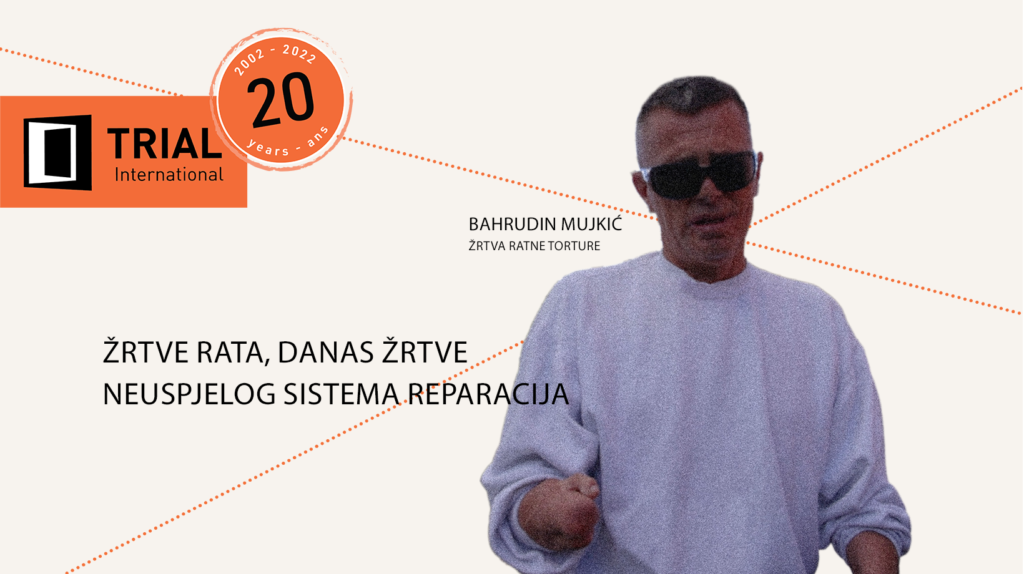NA SJEDNICI UN VIJEĆA ZA LJUDSKA PRAVA UPOZORENO NA PROBLEM PRINUDNE NAPLATE TROŠKOVA POSTUPKA ŽRTVAMA RATA U BIH

Sve veći broj žrtava proteklog rata primoran je platiti hiljade KM troškova postupka Republici Srpskoj nakon što su njihovi zahtjevi za odštetu odbijeni primjenom zastarnog roka. Kako saznaje TRIAL International, nekim žrtvama koje nisu mogle platiti ove troškove je već oduzeta pokretna imovina, što uključuje vozila i kućanske aparate dok se nekima dio iznosa oduzima od mjesečnih primanja poput plata, penzija ili invalidnina. Dio njih obratio se i humanitarnim organizacijama za pomoć. Ovaj problem iznesen je i na trenutnoj sjednici UN Vijeća za ljudska prava kada je zaključeno da je ova praksa „neetična i neprihvatljiva te je u suprotnosti s međunarodnim standardima zaštite žrtava i humanitarnim pravom.“
Sa 22 godine Bahrudin Mujkić je tokom rata preživio brutalna mučenja, čije posljedice živi i danas. „Logor je blaga riječ za taj pakao, kada čovjek prođe četiri zatvora i dva logora. Pošto sam sada slijep, što sam vidio u tom logoru, vidim i sada. I dan danas osjetim polomljene ruke gdje su deformacije.”, kazao je Bahrudin Mujkić. Zbog ratnih tortura koje su zauvijek obilježile njegov život, 2010. godine tužio je Republiku Srpsku, entitet koji je smatrao odgovornim za svoju patnju. Tužba je 2014. godine odbijena primjenom zastarnog roka. Umjesto naknade, on mora platiti 1750 KM troškova zbog neuspjelog postupka. Bahrudinova priča samo je jedna od stotinu sličnih koje preživljavaju žrtve ratnih tortura, koje su nakon rata pokušale ostvariti naknadu štete nastale kao posljedica zločina.
Bosna i Hercegovina nije osigurala adekvatnu naknadu štete žrtvama ratnih zločina. U takvoj situaciji mnogi od njih su se odlučili od oko 2007. do 2010. godine da pokrenu parnične postupke protiv entiteta kojeg su smatrali odgovornim za svoja stradanja, a ponekad i same države. Međutim, 2014. godine Ustavni sud BiH zauzeo je stav o primjeni zastarnih rokova na ovakve tužbe, suprotno relevantnim međunarodnim standardima zaštite ljudskih prava.
„Kao rezultat takvog stava, osim što su odbijeni tužbeni zahtjevi žrtva ratnih zločina, oni su obavezani da plate veoma visoke iznose naknada troškova postupka. S obzirom na to da se radi o građanima koji su uglavnom slabog imovnog stanja i da mnogi od njih nisu mogli da plate te troškove, pokrenuti su izvršni postupci. Imate tako pljenidbu pokretne imovine, kada se ljudima ulazi u domove i oduzima im se pokretna imovina. Neke od njih imaju suicidalne misli koje im se pojavljuju kao rezultat prijema tog dopisa kojim se one obavještavaju o zakazanim ročištima za izvršenje.“, kazala je Adrijana Hanušić Bećirović, viša pravna savjetnica organizacije TRIAL International
Federalno pravobranilaštvo i Pravobranilaštvo BiH odustalo je od potraživanja troškova postupaka od žrtava i trenutno jedino Pravobranilaštvo Republike Srpske ima aktivne izvršne predmete u kojima od žrtava ratnih zločina traže naplatu troškova postupka.
TRIAL International u BiH već dugi niz godina ukazuje na važnost rješavanja ovog problema, te pruža pravnu podršku žrtvama koje se suočavaju za zakonskim preprekama u ostvarivanju svojih prava. Pored toga, ova organizacija pripremila je video o ovom problemu, prikazujući finansijske, moralne i psihološke posljedice koje ova praksa ostavlja na žrtve. Video možete pogledati ovdje.
